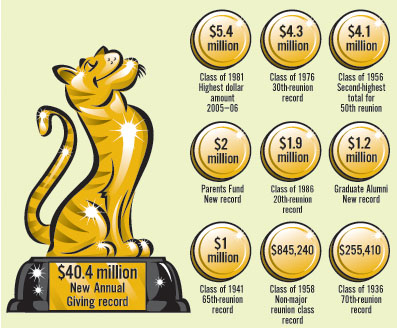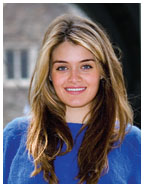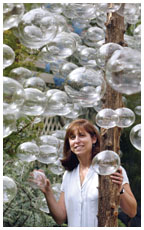
|
September 27, 2006: Notebook
An antidote for the ‘freshman
15’
Daphne Oz ’08 writes a diet book for college students
Another record for Annual Giving
Above, Callie Lefevre ’09, left, and Emily Norris ’09 on the SOS bus about to leave Beirut. Below, Jay Saxon ’05 in Cyprus after his evacuation on a cargo ship. (photos courtesy Callie Lefevre ’09 and Jay Saxon ’05) |
Summer
studies disrupted by Mideast hostilities
When Beirut universities closed in July, Princeton helped students
evacuate
Jay Saxon ’05 was in Beirut for a six-week summer program in Arabic language and culture at the Lebanese American University. Callie Lefevre ’09 and Emily Norris ’09 were studying Arabic a few blocks away at the American University of Beirut. To the south, Jason Turetsky ’07 was learning Hebrew at the University of Haifa in northern Israel.
All had been warned about the possible dangers of traveling to the Mideast for their summer studies. Princeton “told me that it was too dangerous to study in Israel,” Turetsky wrote in a Daily Princetonian Web column. Lefevre was required to petition Nancy Kanach, associate dean of the college who oversees undergraduate study-abroad programs, to approve her application for University placement credit and funding for her language program.
Even when fighting broke out between Israel and Hezbollah forces in Lebanon, “We thought it would blow over,” Lefevre said. “On campus, everything felt pretty safe. But things changed so quickly.” When Israeli bombing of areas of Beirut intensified in retaliation for Hezbollah attacks, the Lebanese American University and the American University of Beirut canceled classes and urged students to evacuate.
The pace of events quickened. The language program Turetsky was enrolled in was moved south to Hebrew University in Jerusalem after two Katyusha rockets landed about five miles from the University of Haifa. From her campus office, Kanach was in contact with International SOS, a British security-consulting firm that provides emergency evacuation services. Princeton contracted with SOS in 2004 to serve faculty and students on University-sponsored trips overseas.
SOS arranged for safe passage by bus for a group of Americans, including Lefevre and Norris, to Damascus, Syria. The group then traveled by plane to Cyprus, while other U.S. citizens were forced to wait until the American embassy could arrange their transportation out of Lebanon. “Our evacuation had all the class divisions of the Titanic,” Lefevre wrote in a widely quoted blog posted on the Huffington Post Web site.
Lefevre praised the professionalism of SOS and the support she received from the University. “I felt the whole time that there really is this home base looking out for you — professors and administrators,” she said.
Saxon was able to board a Norwegian freighter at the port of Beirut that had been diverted en route to Saudi Arabia. The ship took on hundreds of Norwegian citizens and other evacuees, including about 100 Americans, who spent what Saxon termed a “miserable” 12 hours onboard before leaving the freighter in Cyprus.
Saxon said he “absolutely” plans to return to the Mideast, however. “I feel an obligation to not abandon this place,” he said.
Kanach, the associate dean, said SOS “really proved its worth”
in the evacuation of the two students. Asked about some public criticism
that Ivy League students received preferential treatment in their evacuation
from Lebanon ahead of other students, she said other institutions “need
their own preparedness plan; we thought ahead, and every institution needs
to do that.” ![]()
By W.R.O.
MORE ON THE WEB: Link to blogs by Saxon ’05, Lefevre ’09, and Turetsky ’07, click here.

New ‘village’ to house the performing arts
Plans for a new “village” for the creative and performing arts south of McCarter Theatre are beginning to take shape. At a July information session, University planners offered local residents an overview of the proposal, which would require extensive public review. Following are key elements:
— A satellite art museum facility that would focus on contemporary art.
— A performance hall with seating for 500 to 700, plus a pair of “black-box” theaters that would seat about 80 and 200 people.
— Academic space for experimental media, film, theater and dance, music practice rooms, and offices for the new Center for the Creative and Performing Arts.
— A railroad station about 500 feet south of the existing Dinky station, which would be renovated for retail use.
— A realignment of University Place, so that it would form a “V” as it intersects with Alexander Street about 500 feet south of the current intersection.
— Retail space, with a new location for the WaWa convenience store, a restaurant, coffee shop, museum shop, visitors center, and wine shop. Some residential space also may be proposed.
— A small “town square” across from Forbes College that would serve as a gateway from the south to the University and to the town.
The plan, developed by architectural design firm Renzo Piano Building Workshop, proposes “a village-like configuration, with a number of buildings that are not particularly tall,” said Robert K. Durkee ’69, University vice president and secretary.
While a $101 million gift announced in January by Peter B. Lewis ’55 provided “an extraordinary start” for the arts initiative, Durkee said, “a lot of fundraising will be needed before this goes forward.” He estimated the project would cost “at least three times” the amount of Lewis’ gift.
In another sign of the University’s expanding commitment to the
arts, novelist and short-story writer Jeffrey Eugenides, the Pulitzer
Prize-winning author of Middlesex and The Virgin Suicides,
will join the creative writing program as a professor in the fall of 2007.
![]()
By W.R.O.

Why do nations go to war? One factor may be overconfidence, and according
to a recent laboratory study of conflict scenarios, men are more overconfident
than women and more likely to attack unprovoked. Dominic Johnson, a lecturer
in public and international affairs at the Woodrow Wilson School, and
colleagues from Harvard and the University of California, Santa Barbara,
collected data from 200 subjects who engaged in one-on-one “crisis”
games at a Harvard Business School computer lab. The results, published
in Proceedings of the Royal Society Series B, showed that men
had a greater expectation of performing well in the game and chose to
attack or retaliate more often than their female counterparts. While the
authors admit that the anonymous, two-player scenarios were very different
from the complex situations that lead to international conflict, they
add that the study is a “first step” toward showing empirically
that “having positive illusions increases the probability of war.”
![]()

Daphne Oz ’08 (Courtesy Newmarket Press) |
An
antidote for the ‘freshman 15’
Daphne Oz ’08 writes a diet book for college students
Many students fear the “freshman 15” — weight typically gained during the first year of college — but Daphne Oz ’08 actually lost 10 pounds during her first semester. In her new book, The Dorm Room Diet, she shares her strategy for success. Her book, published by Newmarket Press, offers an eight-step plan addressing nutrition, exercise, supplements, campus diet traps, and motivation. A Near Eastern studies major and the daughter of a cardiologist who is also a bestselling author, Oz admits to loving ice cream; her plan allows for occasional indulgences. She spoke with PAW intern Lindsey M. Huddle ’07:
Why did you decide to write this book?
What really started The Dorm Room Diet was realizing when I got to school that it was such a completely new environment. I was living away from home for the first time. I had to find my own food; where, when, and what to eat were all my decisions. You’re trying to juggle all of these stresses — academic, social, emotional. ... All of this independence and freedom is thrust on us, and you have the opportunity to make that work for you and make you a healthier person.
What are the best tips that everyone — not just college students — could benefit from?
Everyone could benefit from the tip that you should be drinking half of your body weight [in pounds] in ounces of water every day. It improves bodily function, my skin is clearer, my energy is better, and I’m less hungry because I’m full from the water. The second would be: Don’t eat less than two hours before bed, because it will make your sleep less deep. My own personal habit is that I like to eat about every two or three hours. ... I never feel deprived or like I’m hungry at any one meal, so I don’t need to binge on anything.
Is there one lifestyle change a person can make for best results?
The one thing that I want people to take away is about substitution when you can and moderation where you can’t. ... If I’m going to be satisfied eating an apple instead of a brownie, I’ll do that. But if I really feel like I’m going to end up being obsessed over the brownie and depressed if I can’t eat it, then I’ll have it — but I’ll have half of it, or just one.
Are the dining options at Princeton conducive to following The Dorm Room Diet?
Princeton is a particularly health-conscious campus. I think it’s largely due to the fact that students, as buyers, demand that. For instance, the dining hall always has the grill option.
What was your motivation for losing weight — and now, maintaining your weight — and how can people find their own motivation?
When I was in high school, being overweight held me back from performing
as well as I could in sports, and that was depressing. I vowed that I
would never be the one stepping on my own feet and not letting myself
be as successful as possible. It’s also important for me to set
short-term goals — like I’ll lose five pounds this month.
So it’s important to choose short-term goals that are easily realizable
and that you’ll be successful at to give you confidence, but also
to have a life goal ... I can give you information, and I can give you
my story and hope that it inspires you, but ultimately it is up to you
to find the motivation and then make that transformation.
![]()
More on the web: Book excerpts and an extended interview with Daphne Oz '08, click here.

Thirty-five percent of Princeton’s Class of 2006 left campus with full-time jobs, the highest rate in five years. The new graduates reported an average starting salary of $55,117, up 9.3 percent from 2005, according to the Office of Career Services.
A strong job market drew 68 percent of the new graduates to seek employment, and financial-sector jobs dominated the early offers. Of the seniors who had accepted jobs by May, 46.8 percent were employed in financial services, which also had the highest salary figures — on average, more than $61,000.
Nearly 21 percent of the Class of 2006 will attend graduate school. Programs in science and math were the most popular, followed closely by law school and medical school. Harvard, Stanford, and Columbia remained the most popular domestic destinations for Princetonians pursuing graduate study, while Cambridge and Oxford were the most popular institutions for those studying abroad.
Included in the group of graduates pursuing work were those who planned
to serve yearlong internships with nonprofit, public service, or international
organizations, who made up more than 12 percent of the class. ![]()
By B.T.

William H. Branson, the John Foster Dulles Professor in International
Affairs, emeritus, died Aug. 15 in Princeton at age 68. An expert in international
economics, Branson spent 34 years on the faculty and authored the widely
used textbook Macroeconomic Theory and Policy. He also served
as a senior staff economist for the President’s Council of Economic
Advisers and as a consultant for the World Bank, the Federal Reserve,
and the International Monetary Fund.
![]()

Another record for Annual Giving

The 2005–06 Annual Giving campaign brought in $40.4 million, the
highest total in University history and $3.4 million more than last year.
More undergraduate alumni contributed than ever before, with 58.2 percent
participating. The Class of 1928 reached 100 percent with all four of
its members contributing, just days after Class Agent Hyde Gillette’s
100th birthday. (Steven Veach)
![]()

Harvard’s Sept. 11 announcement that it would end its early-admission program next fall sharply focused the issue for Princeton and other selective universities: Is it time to follow suit and move to a single admission deadline? Princeton has offered a binding early-decision option to applicants since 1995; 49 percent of the newly arrived Class of 2010 was admitted through early decision. In its decision, Harvard cited a concern that early-admission programs unfairly favor those with privileged backgrounds. Janet Rapelye, Princeton’s dean of admission, applauded Harvard’s move, and University spokeswoman Cass Cliatt ’96 told PAW that if Princeton sees its peers moving toward a single admission date, “we could be comfortable making a similar change.” As PAW went to press, University administrators were preparing to discuss the issue with the Board of Trustees.
DAN-EL PADILLA PERALTA ’06, the Latin salutatorian at Commencement in June and recipient of the Sachs Scholarship, was scheduled to fly to England Sept. 15 after obtaining a student visa to study classics at Oxford. Federal authorities declined to act on a request for student status by Padilla Peralta, an illegal immigrant, before graduation. Because he does not have legal status in the United States, Padilla Peralta will need to apply to U.S. authorities for a waiver each year for up to 10 years for permission to return to the country to visit his family.
An unusual alumni TRIP TO NORTH KOREA that had been planned for August was canceled. According to Leslie J. Rowley, executive manager of Princeton Journeys, the Alumni Association’s travel program, participation began to unravel after the government of North Korea launched test missiles and shortened the group’s planned time in the country from about a week to three days. Severe flooding about a month before departure prompted the government to revoke permission altogether, Rowley said. She did not know whether Princeton Journeys would attempt to arrange a trip in the future. Prospective participants had been advised by Princeton Journeys that the trip would be “very controlled” and that they would be “expected to bow as a gesture of respect at the statue of Kim Il Sung,” the country’s late leader.
In July, COTTAGE CLUB lost a legal appeal in its attempt to gain tax-exempt status as a historic building. The club, which is listed on the state and federal registers of historic places, was denied tax-exempt status in 2003 because it was not sufficiently accessible to the general public. The following year, the New Jersey Legislature took action to prevent eating clubs and other privately owned historic buildings from becoming tax-exempt, adding stringent public-access requirements to existing guidelines in what was nicknamed the “Cottage Bill.”
Mathematics professor Andrei Okounkov and alumnus Terence Tao *96 each were awarded a FIELDS MEDAL, commonly called math’s Nobel Prize, at the International Congress of Mathematicians in Madrid Aug. 22. Okounkov was honored for “contributions bridging probability, representation theory, and algebraic geometry,” according to the award citation. Tao, a professor at UCLA, was commended for work in several areas, including partial differential equations, harmonic analysis, and combinatorics. The Fields prizes are presented every four years. Recipients must be 40 years old or younger.
Princeton leads the U.S. NEWS RANKINGS of best national
universities, after a three-year tie with Harvard for the No. 1 position;
it is ranked first for students graduating with the least debt and third
for best value. Black Enterprise magazine ranked Princeton 38th
among the top 50 institutions for African-American students, noting that
9.4 percent of Princeton freshmen in the fall of 2005 were African-Americans.
That was 38 percent higher than the prior year, the largest percentage
increase among Ivy schools. ![]()

(Frank Wojciechowski) |
In her research, mechanical and aerospace engineering professor Naomi
Leonard ’85 has used underwater robotic gliders to gain a better
understanding of complex ocean dynamics. The sculpture “Motion in
the Ocean,” inspired by Leonard’s work, replicates that aquatic
complexity with hand-blown bubbles created by glass artist Bob Kuster.
The piece is one of 15 on display at Quark Park, a celebration of science
and art that will run through December on Paul Robeson Place near Witherspoon
Street. Ten University professors, including President Tilghman, are collaborating
with local artists. Quark Park was organized by Kevin Wilkes ’83,
Peter Soderman, and Alan Goodheart, the founders of the literature-inspired
Writers Block exhibit that occupied the same site in 2004.
![]()



